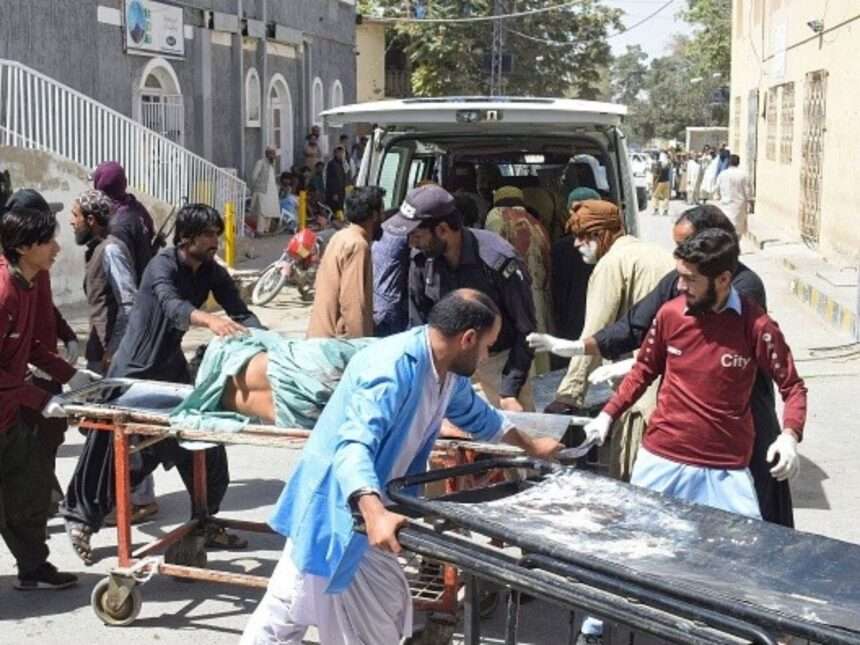Navigating the Shadows: Pakistan’s Ongoing Struggle with Terrorism and Extremism
The occasion of Eid Miladun Nabi, a day meant for celebration and reflection, was brutally marred by acts of terrorism in Mastung, and will always be remembered as a day that turned bloodbath. These attacks serve as a stark reminder that despite significant progress in combating extremism, Pakistan continues to grapple with the persistent threat of terrorism.
To combat this growing extremism, the government must take decisive steps to eliminate the root causes of terrorism. This includes countering the use of social media for recruitment and propaganda and promoting religious tolerance and education. Pakistan’s future stability hinges on its ability to confront and defeat the menace of extremism.

Unraveling the Complexity: Recent Acts of Terrorism
In Mastung, a suicide bomber targeted an Eid Miladun Nabi event, resulting in the tragic loss of over 55 innocent lives. Meanwhile, in Hangu, a mosque within a police station was attacked, claiming the lives of at least five worshipers. The fact that no group has claimed responsibility for these attacks only adds to the complexity of the situation.
A decade ago, Balochistan, especially Quetta and Mastung, was in the grip of intense sectarian militancy perpetrated by Lashkar-i-Jhangvi (LJ). Mass casualty attacks were a grim reality in the provincial capital, and Shia pilgrims were frequently targeted in Mastung. However, there has been a noticeable decline in LJ’s activities in Balochistan, leading experts to believe that other militant groups, such as the Islamic State Khorasan Province (IS-K), might be involved.
Evolution of Threat Landscape: A Nuanced Approach NeededIt is important to acknowledge that the threat landscape in Pakistan has evolved. Many experts speculate that former LJ militants may have been absorbed by IS-K, which operates across the region. Just last month, authorities claimed to have eliminated an IS-K “commander” in Mastung, underscoring the group’s presence and influence. Khyber Pakhtunkhwa has also witnessed its share of violence, including attacks by the Tehrik-i-Taliban Pakistan (TTP) and its offshoots, along with IS-K. The security situation in Balochistan, marked by both separatist and religiously inspired militancy, remains a concern.
Addressing the Menace: Prioritizing Counterterrorism Efforts
In the face of these challenges, it is imperative for the state to allocate all available resources to neutralize terrorists in Balochistan and the rest of the country. Failing to eradicate this menace at this stage could lead to a security nightmare of significant proportions. The security establishment must prioritize an effective counterterrorism strategy to dismantle militant networks.
The upcoming elections demand a peaceful environment, and militant actors may seek to disrupt the transition to an elected government. Therefore, the caretaker administration must commit its energies to ensure peaceful polls and curbing the militant threat.

Looking Forward: A Call for Comprehensive Counterterrorism Measures
The recent attacks on such a revered day serve as a grim reminder of Pakistan’s past struggles with extremism and terrorism. A generation has grown up in the shadow of constant violence, leaving deep scars on their minds. Hopes for lasting peace were dashed after the fall of Kabul, as extremist elements found renewed vigor. The growing complexity of Pakistan’s terror threat demands a nuanced approach. Various militant groups, each with distinct strategies and motivations, underscore the need for tailored counterterrorism efforts. The TTP’s safe haven in neighboring Afghanistan further complicates matters and poses a grave threat to Pakistan’s security.
A Comprehensive Strategy: Ceasing Differentiation and Promoting Harmony
Regardless of the group responsible, these attacks are driven by hatred and a common ideology of violence. The government must cease treating different militant groups differently and formulate a comprehensive strategy to address extremism. Religious tolerance and harmony are rapidly eroding, exacerbated by hateful content and online radicalization. In the wake of these challenges, Pakistan stands at a critical juncture, necessitating unified efforts to combat terrorism and extremism for a more secure and harmonious future.
1. Q: What were the recent acts of terrorism mentioned in the article, and why were they particularly significant?
- A: The recent acts of terrorism occurred during Eid Miladun Nabi in Mastung and targeted a mosque in Hangu. These events are significant as they marred a day of celebration and reflection, emphasizing the persistent threat of terrorism in Pakistan.
2. Q: How has the threat landscape in Pakistan evolved, and what factors contribute to the complexity of the situation?
- A: The threat landscape has evolved with the decline of Lashkari-Jhangvi (LJ) activities in Balochistan. However, the emergence of groups like the Islamic State Khorasan Province (IS-K) adds complexity. The article suggests that former LJ militants may have joined IS-K, contributing to the intricate nature of the security situation.
3. Q: What steps are recommended for combating the threat of terrorism in Pakistan?
- A: The decisive steps by the government, include countering social media for recruitment, promoting religious tolerance and education, and allocating resources to neutralize terrorists. A comprehensive counterterrorism strategy is emphasized to dismantle militant networks.
4. Q: Why is the upcoming election mentioned in relation to the security situation, and how might militants seek to disrupt the transition to an elected government?
- A: The upcoming elections demand a peaceful environment, but militants may attempt to disrupt the transition. Ensuring security is crucial, and the caretaker administration must commit efforts to prevent any interference by militant actors.
5. Q: How does the article propose addressing the overarching issue of extremism in Pakistan?
- A: The article suggests addressing extremism by formulating a comprehensive strategy that treats all militant groups uniformly. It emphasizes the importance of promoting religious tolerance, dismantling militant networks, and countering online radicalization for a more secure and harmonious future.


